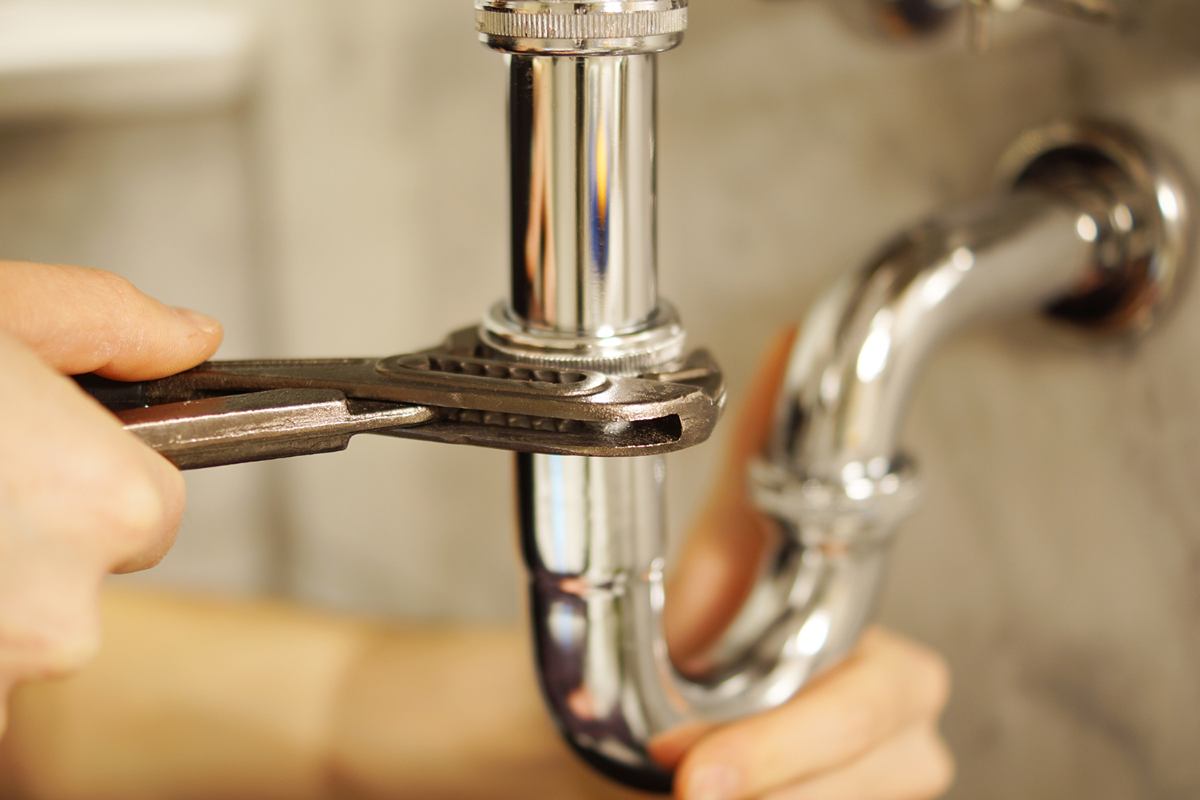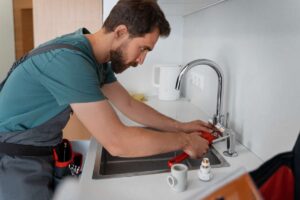Ever heard a strange gurgling sound coming from your sink, even though the water drains just fine? Don’t worry you’re not alone. When a sink gurgles but drains fine, it can be confusing and a bit annoying. While it may seem harmless, this sound could be a sign of a hidden plumbing issue that needs your attention. In this guide, we’ll explain what causes the gurgling, how to fix it yourself, and when to call a plumber. Everything is explained in simple steps so anyone can understand. Let’s solve this noisy problem together no tools or plumbing experience required!
What It Means When Your Sink Gurgles But Drains Fine
If your sink gurgles but drains fine, it’s likely caused by air trapped in the plumbing. This sound is a result of air bubbles moving through the pipes as the water drains away. The good news is that the water is still draining properly, which means your pipes aren’t fully clogged. However, the gurgling noise is usually a sign of a venting or airflow issue in your plumbing system.
When your plumbing vent is blocked or not functioning properly, air can’t escape as the water drains, causing that gurgling sound. It’s not always a serious issue, but it’s a clue that something in the system needs attention.
Main Causes of a Gurgling Sink That Drains Well
If your sink is gurgling but still draining fine, it’s likely due to one of the following common causes. Understanding these can help you figure out whether it’s a simple fix or if you need to call in a professional.
1. Partial Blockages in the Drain or P-Trap
A gurgling sink is often caused by a partial blockage in the drainpipe or the P-trap. Over time, small items like grease, hair, and soap can build up inside the pipes, trapping air as water drains. When this trapped air bubbles up, it creates the gurgling sound you hear.
Common culprits that cause partial blockages:
- Grease from cooking or oily products
- Hair (especially in bathroom sinks)
- Soap scum
- Food particles or debris
- Mineral buildup (hard water)
2. Clogged or Blocked Air Vent
Your plumbing system has air vents that allow air to flow freely through the pipes while water drains. If these vents become clogged or blocked, air can’t escape properly, causing the air to bubble up through your sink, which leads to the gurgling sound.
What happens when air vents are blocked:
- The water drains more slowly, and air needs to escape, leading to gurgling.
- Often happens if leaves, dirt, or debris block the vent pipes, especially those on the roof.
3. Incorrect Pipe Installation or Slope
In some cases, the pipes may not have been installed correctly, or they might not have the proper slope. Plumbing pipes are meant to be angled in a way that allows water and air to flow smoothly. If the slope is incorrect, air can get trapped in the pipes, causing the gurgling noise as it tries to escape.
How improper pipe slope causes trapped air:
- Pipes need a downward slope for water to flow efficiently.
- If the slope is too shallow or uneven, air pockets get trapped and cause gurgling.
4. Sewer Line Problems
In rare cases, a gurgling sink could be a sign of a more serious plumbing issue—like a problem with your sewer line. If the sewer line is blocked or partially collapsed, air pressure builds up, which can cause gurgling in sinks, toilets, or other drains.
Warning signs of sewer line problems:
- Gurgling or bubbling sounds in multiple drains, including toilets
- Unpleasant smells coming from the sink or bathroom
- Slow drainage or water backups in other fixtures, like the toilet or tub
How to Fix a Gurgling Sink
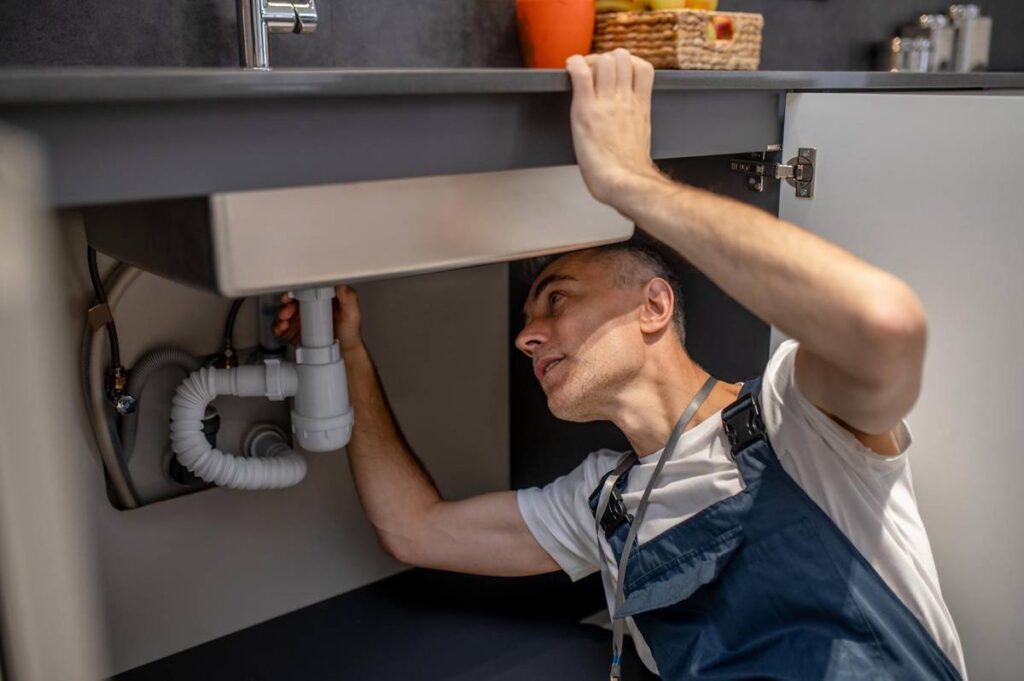
A gurgling sink can be annoying, but the good news is that you can often fix it yourself with a few simple steps. Here’s a step-by-step guide to help you troubleshoot and resolve the issue without calling a plumber—unless it’s absolutely necessary.
Step-by-Step DIY Fixes
If you’re hearing gurgling from your sink but the water is still draining fine, try these easy fixes first. Most of these steps use common household items, and you don’t need to be a plumbing expert to get your sink back to normal.
Boiling Water
How it helps: Pouring boiling water down the drain can help loosen any grease or soap buildup that might be causing a partial blockage.
How to do it: Simply heat up a kettle of water until it boils, then slowly pour it down the drain. Wait a few minutes to see if the gurgling stops.
Baking Soda + Vinegar
How it helps: This classic combination can help break up grease, soap scum, and even small clogs that may be causing the gurgling.
How to do it: Pour about half a cup of baking soda into the drain, followed by half a cup of vinegar. Cover the drain with a stopper and let the mixture sit for about 15 minutes. Then, flush with hot water.
Clean the P-Trap
How it helps: The P-trap is a curved pipe under the sink that catches debris. If it’s clogged, it can cause air to be trapped in the pipes, creating the gurgling noise.
How to do it: Place a bucket under the P-trap to catch any water. Use a wrench to carefully loosen the trap, then remove it and clean out any debris. Reassemble the parts once it’s clear.
Check Air Vents
How it helps: Blocked air vents can prevent proper airflow, leading to gurgling sounds.
How to do it: Check your plumbing vent for any visible blockages, like leaves or debris. If the vent is on your roof, use a ladder to carefully inspect and clear it. If you can’t access the vent, you may need a professional to help.
Use a Drain Snake (if needed)
How it helps: If the previous steps haven’t worked, a drain snake can help you clear deeper blockages in the pipes.
How to do it: Insert the snake into the drain and twist it to break up any clogs. Gently pull it out, cleaning the debris as you go. Be careful not to damage the pipes.
Important: These fixes use simple tools that most homeowners already have. If none of these methods work or you feel uncomfortable with the process, it may be time to call a plumber, especially if the problem seems to be a more serious blockage or an issue with your sewer line.
How to Stop a Gurgling Bathroom Sink
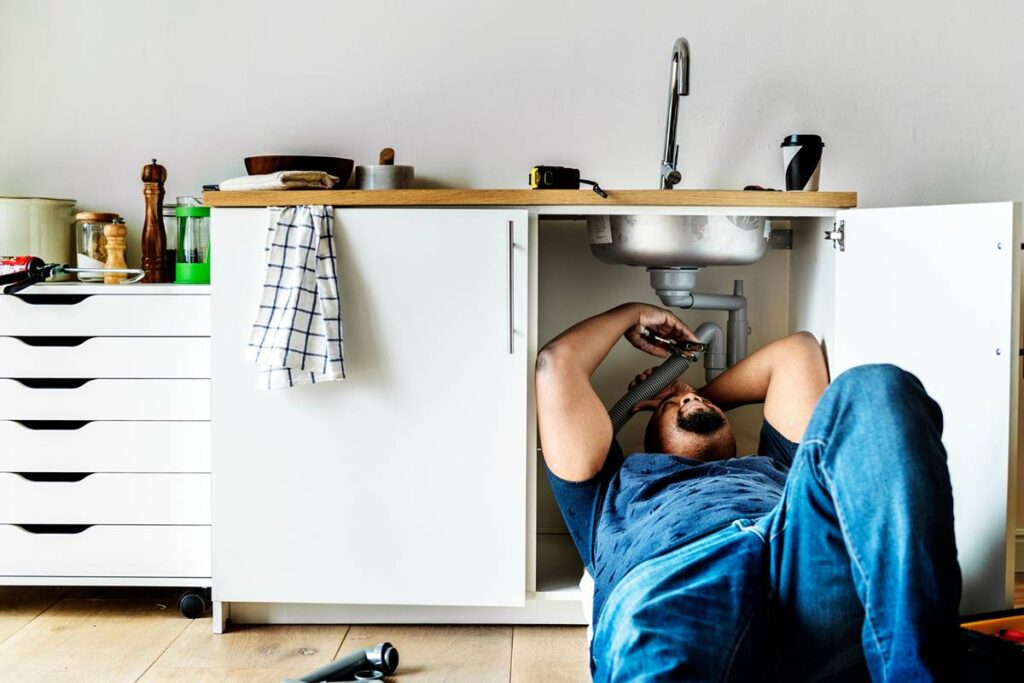
A gurgling bathroom sink can be just as frustrating as a kitchen sink. Fortunately, the causes are often related to specific bathroom habits, such as soap scum or toothpaste buildup. Let’s dive into bathroom-specific causes and easy fixes to stop the gurgling soun
Bathroom-Specific Causes & Fixes
Bathroom sinks experience different types of buildup and blockages compared to kitchen sinks. Understanding these unique factors will help you fix the issue quickly and get your sink draining smoothly again.
Soap Scum or Toothpaste Buildup
Why it happens: Over time, soap and toothpaste can build up inside the drain, causing partial blockages that trap air and lead to gurgling sounds. This is especially common in bathroom sinks where these products are frequently used.
How to fix it: Try using a combination of baking soda and vinegar to clear out the buildup. Pour half a cup of baking soda into the drain, followed by half a cup of vinegar, then let it sit for 15 minutes. Flush with hot water. You can also use a plumbing snake to clear out larger blockages.
Check the Overflow Drain and Vent
Why it matters: Bathroom sinks often have an overflow drain near the top. If this drain is clogged or blocked, it can disrupt airflow, leading to gurgling. Similarly, the plumbing vent connected to your sink might be obstructed, causing air pressure issues.
How to fix it: First, check the overflow drain for debris or buildup. Use a small brush or cloth to clean it. Next, inspect the vent for any blockages, such as leaves or dirt. If necessary, clear the vent or call a professional plumber for assistance.
Special Sink Cleaners or Enzymatic Drain Cleaners
Why they work: If natural cleaning methods don’t work, you can turn to special sink cleaners or enzymatic drain cleaners designed for bathroom sinks. These cleaners break down organic materials like soap scum and toothpaste, helping to prevent gurgling.
How to use: Follow the product instructions to pour the cleaner down the drain. Let it sit for the recommended time (usually 15–30 minutes), then flush with warm water. Enzymatic cleaners are safe for pipes and work over time to maintain clear drains.
Common Sink Gurgle Causes & Solutions
| Cause | Quick Fix | When to Call a Pro |
| Soap or Hair Buildup | Pour boiling water followed by baking soda and vinegar. Let it sit for 15 minutes, then flush with hot water. | If bad smell or backup appears, it’s time for professional help. |
| Blocked Air Vent | Clear debris like leaves or dirt from the vent stack. | If persistent gurgling continues, call a plumber to check the system. |
| Improper Pipe Slope | Not DIY – improper pipe slope must be fixed by a professional plumber. | Always — improper slope can lead to larger plumbing issues, requiring a plumber’s expertise. |
| Sewer Line Issue | Not DIY – If you suspect issues with the sewer line, call a plumber. | Bad smells or backup are clear signs that the sewer line needs professional attention. |
Pro Tips
While many common solutions to a gurgling sink are widely known, there are a few pro tips that can save you time, money, and frustration in the long run. These tips go beyond basic fixes and bring extra value, ensuring your sink stays clear and trouble-free.
Add a Drain Guard
One simple yet effective way to prevent future blockages is by installing a drain guard. Drain guards are small mesh screens that sit over the sink drain, capturing hair, food particles, and soap scum before they enter the pipes. This prevents buildup that causes gurgling and clogs. It’s an affordable way to maintain cleaner pipes and reduce the need for frequent cleaning.
Monthly Maintenance Routine
Maintaining your sink doesn’t have to be a hassle. A monthly maintenance routine is a great way to keep things flowing smoothly. Here are a few simple steps to follow:
- Pour hot water weekly: A quick flush with hot water helps clear minor debris and keep the pipes clean.
- Use an enzymatic cleaner monthly: Enzymatic cleaners break down organic buildup like soap scum and food particles, keeping your drain running smoothly.
- Avoid pouring grease down the drain: Grease can easily harden inside pipes, causing blockages. Make sure to dispose of grease in a safe container, not the sink.
Listen for Gurgle Patterns
Believe it or not, the timing of your gurgling sink can provide valuable clues about the issue. Pay attention to when the gurgling happens:
- Morning vs. night: If the gurgling is more frequent at specific times, it may indicate an issue with water pressure or airflow. For example, a morning gurgle could be related to a higher volume of water usage overnight, while a night-time gurgle might suggest a blocked air vent or an issue with drainage after a day of use.
Use Smart Home Water Sensors (2025 Tip!)
These modern devices monitor your sink’s water flow and alert you to any irregularities. For example, if there’s a significant change in water pressure or a sudden blockage, the sensor can send an alert to your smartphone, giving you a heads-up before the problem worsens.
Using smart sensors adds a new layer of convenience and trust to your home. Not only will you be able to catch potential issues early, but it also gives you a tech-savvy way to stay on top of your plumbing without always needing to call a plumber. It’s a forward-thinking solution that’s especially helpful in smart homes.
When to Call a Professional Plumber
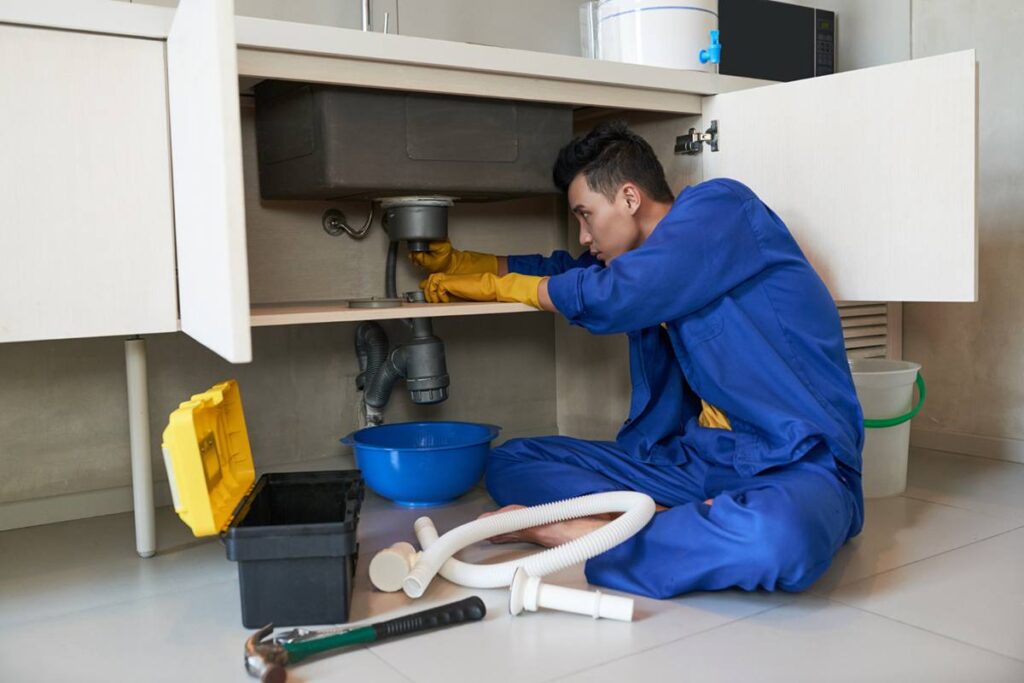
While many sink issues can be fixed with a bit of DIY effort, there are times when it’s best to call in a professional plumber. If you notice any of the following signs, it might indicate a more serious issue that requires expert attention:
Gurgling in Multiple Drains
If you hear gurgling sounds coming from multiple drains throughout your home, it’s often a sign of a ventilation or drainage system issue. A clogged main drain line or a blocked air vent can cause water to back up in various parts of your plumbing system. This isn’t a problem you can solve with simple fixes like boiling water or baking soda—it’s time to bring in a professional to inspect the system.
Bad Sewer Smell
A persistent bad sewer smell coming from your sink or drains could be a sign of a more serious plumbing issue, such as a clogged sewer line or a broken vent stack. This is not just an unpleasant odor—it could indicate that waste is not draining properly, which can lead to bigger problems down the line. If the smell doesn’t go away after cleaning, it’s time to call a plumber.
Water Backing Up
If water backs up into your sink or other drains, it could indicate a major blockage or sewer line problem. This is not something you should ignore, as it can lead to more severe plumbing damage and potentially water damage to your home. In such cases, calling a professional plumber immediately is essential to prevent further issues.
FAQS
Why is my sink gurgling without blockage?
A gurgling sink can be caused by airflow issues, like a clogged air vent or partial blockages. It’s not always a full clog but can still affect drainage. Proper venting is key to avoiding these noises.
How do you fix a gurgling sink?
Try pouring boiling water or using baking soda and vinegar to clear minor blockages. If the problem persists, clean the P-trap or check the air vents for clogs. These fixes usually resolve the issue.
How to get air out of drain pipes?
To remove air from drain pipes, check if the vent system is clear. Clear any blockages in the vent stack and ensure proper pipe slope to allow airflow. This should stop gurgling sounds.
Is gurgling sink bad?
A gurgling sink is often a sign of airflow or partial blockage issues, but it’s not usually an emergency. However, ignoring it may lead to more serious plumbing problems, like backups or slow drainage.
How do I stop my water pipes from gurgling?
Ensure your air vents are clear and that your pipes have the correct slope. You can also try cleaning the vent pipes or using a drain snake to remove minor blockages. Regular maintenance helps prevent gurgling.
Why does my sink gurgle but drain fine?
Your sink may gurgle due to trapped air in the pipes or a blocked air vent. This doesn’t affect draining but can create annoying noises. Ensuring proper venting and clearing minor blockages should fix this
Is gurgling a sign of a clog?
It can be, but gurgling is usually more of an airflow issue rather than a full clog. If the sink drains fine, the problem may be related to partial blockages or blocked vents that disrupt airflow.
Can I fix a gurgling sink myself?
Yes, you can fix a gurgling sink yourself by using simple remedies like boiling water, baking soda, or cleaning the P-trap. This article covers easy DIY steps to help solve the problem.
Conclusion
If your sink gurgles but drains fine, it might be an annoying but manageable issue. As we’ve discussed, there are several common causes, such as partial blockages or a clogged air vent, that can lead to the gurgling sound. Before calling in a professional, try the simple DIY fixes like using boiling water, baking soda, or cleaning the P-trap to see if the issue resolves.
However, remember that if you continue to experience gurgling or notice bad smells or water backing up, it may be time to call a plumber to avoid more serious problems. By taking quick action, you can prevent larger plumbing issues from developing.

